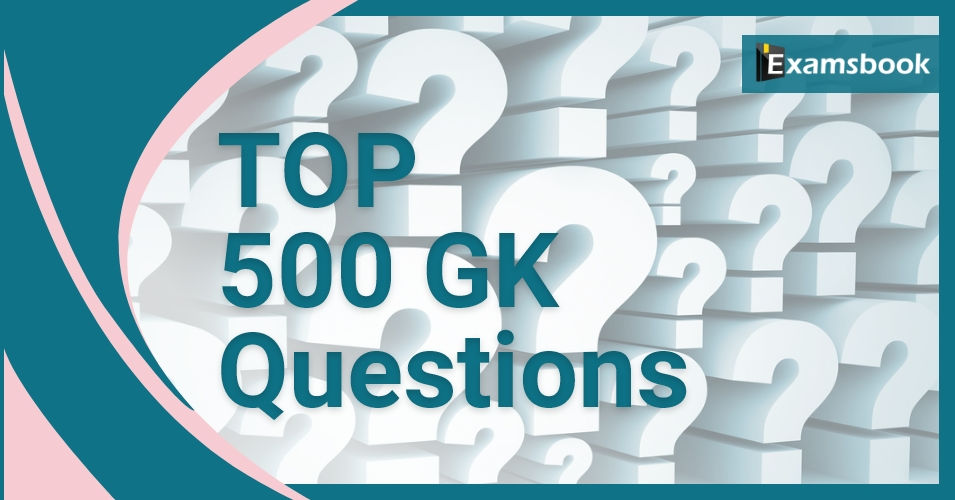Top 500 GK Questions 2023-24

Are you looking for top GK questions? So, assume that your search is now completed. The GK question is useful for almost all students, and each student needs to read common knowledge questions. General Awareness acts an important role in passing the CBT test as well as a descriptive paper.
Top 500 GK Questions
Here, I am providing the most important Top 500 general knowledge questions in English and Hindi for the students who are continuously trying for competitive exams. In this post, I have updated the most important GK questions around the world and have answered the latest current affairs of India and many topics.
If a maximum of 25 to 30 questions from the General Knowledge section are asked in your exam, this blog of 500 GK Questions will help you cover almost all the GK questions. You can also say the Bumper Blog of GK Questions.
To Get Current Affairs and General knowledge Mock Test, Practice Test, and Live Test, Click: General Knowledge Mock Test and Current Affairs Mock Test
General Knowledge Questions
Q : Part IV of the Indian Constitution deals with what?
(A) Fundamental Rights
(B) Fundamental Duties
(C) Directive Principles of State Policy
(D) None of the above
Correct Answer : C
Explanation :
Part IV of the Constitution of India (Article 36–51) contains the Directive Principles of State Policy (DPSP). These principles aim at ensuring socio-economic justice to the people and establishing India as a Welfare State.
The first meeting of the Constituent Assembly took place on 9 December 1946. Which major political party boycotted it?
(A) Bharatiya Jana Sangh
(B) Garam party
(C) Praja Socialist Party
(D) Muslim League
Correct Answer : D
Explanation :
The Constituent Assembly held its first meeting on December 9, 1946. The Muslim League boycotted the meeting and insisted on a separate state of Pakistan.
Under which of the following pardoning power of the President, the term of punishment is reduced without changing its nature?
(A) commutation
(B) avoidance
(C) postponement
(D) procrastination
Correct Answer : B
Explanation :
Under remission, the duration of sentence is reduced without changing its character. Under commutation, the punishment is changed to another. Under respite, less sentence is awarded. Under reprieve, the sentence is suspended temporarily.
For how long can the President of India retain a bill in pocket veto?
(A) one month
(B) six months
(C) twelve months
(D) indefinitely
Correct Answer : D
Explanation :
A pocket veto is a kind of veto enjoyed by the President of India by keeping a bill on his table indefinitely without giving or refusing assent. He will not take any action on the bill under Pocket veto. The first president to use Pocket Veto was Gyani Zail Singh.
Who was the President of the Republic of India who always called Indian secularism as 'Equality of all religions'?
(A) Dr. S. Radhakrishnan
(B) Dr.Zakir Hussain
(C) Dr. Rajendra Prasad
(D) Giani Zail Singh
Correct Answer : A
Explanation :
Dr. S. Radhakrishnan is the only President who always called Indian secularism as equality of all religions.
Who presides over the joint sitting of Parliament?
(A) Prime Minister
(B) President
(C) Speaker of Lok Sabha
(D) Chief Minister
Correct Answer : C
Explanation :
The Speaker of the Lok Sabha presides over the joint sitting of the Lok Sabha and the Rajya Sabha. The Deputy Speaker of the Lok Sabha presides in his absence.
A member of the Union Public Service Commission can be removed
(A) by the President
(B) by the Prime Minister
(C) by the Chief Justice of the Supreme Court
(D) by the Chairman of the Union Public Service Commission
Correct Answer : A
Explanation :
It laid down the manner in which a member of a Public Service Commission may be suspended or removed. The President was empowered to remove a member of a Public Service Commission in two instances – (i) proof of misbehaviour and (ii) automatic disqualification.
How many members of the Rajya Sabha are nominated by the President?
(A) 5
(B) 12
(C) (1/5) of the total members
(D) 10
Correct Answer : B
Explanation :
The Rajya Sabha should consist of not more than 250 members - 238 members representing the States and Union Territories, and 12 members nominated by the President.
The President of India during the regime of the Janata Party was
(A) Fakhruddin Ali Ahmed
(B) N. Sanjeev Reddy
(C) Giani Zail Singh
(D) R. Venkataraman
Correct Answer : B
Explanation :
Neelam Sanjiva Reddy (May 19, 1913 – June 1, 1996) was the sixth President of India.
What are the functions of the Members of Parliament?
(A) Lawmaking
(B) Budget approval
(C) Examining government policies
(D) All of the above
Correct Answer : D
Explanation :
Broad responsibilities of the members of parliament of Lok Sabha are; Legislative responsibility: To pass Laws of India in the Lok Sabha. Oversight responsibility: To ensure that the executive (i.e. government) performs its duties satisfactorily.



